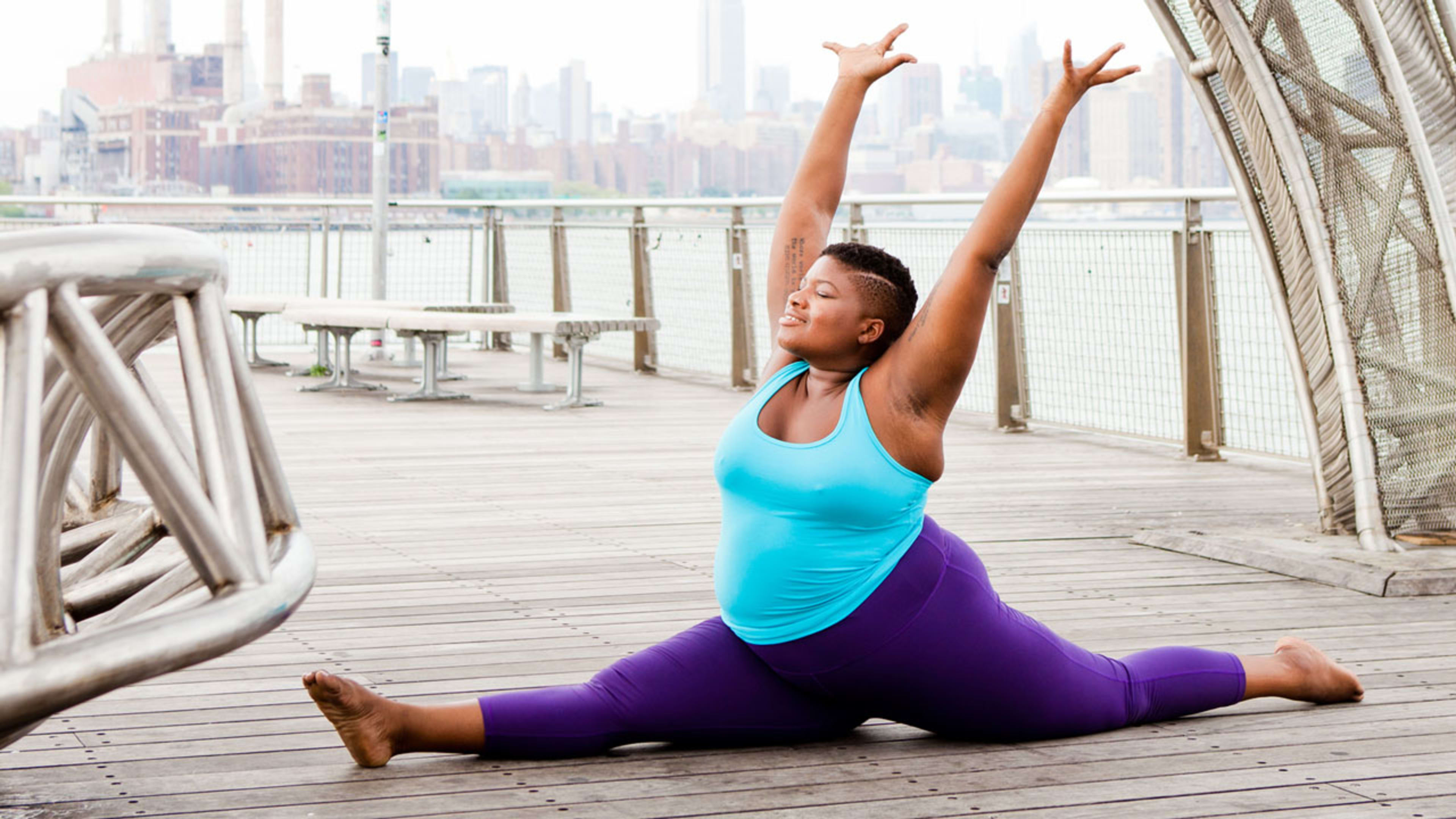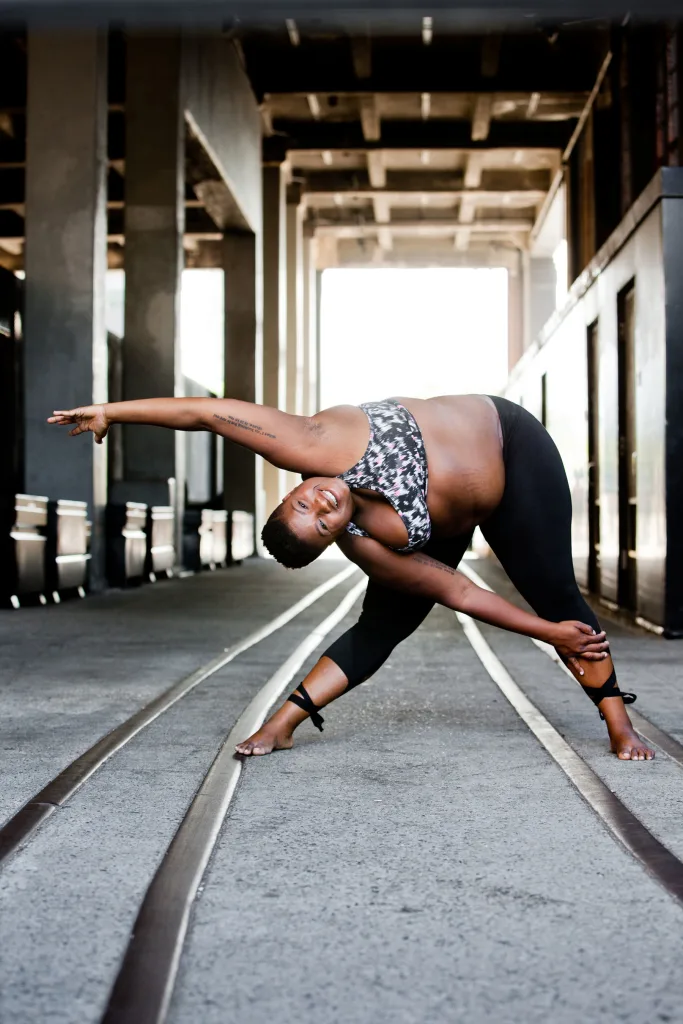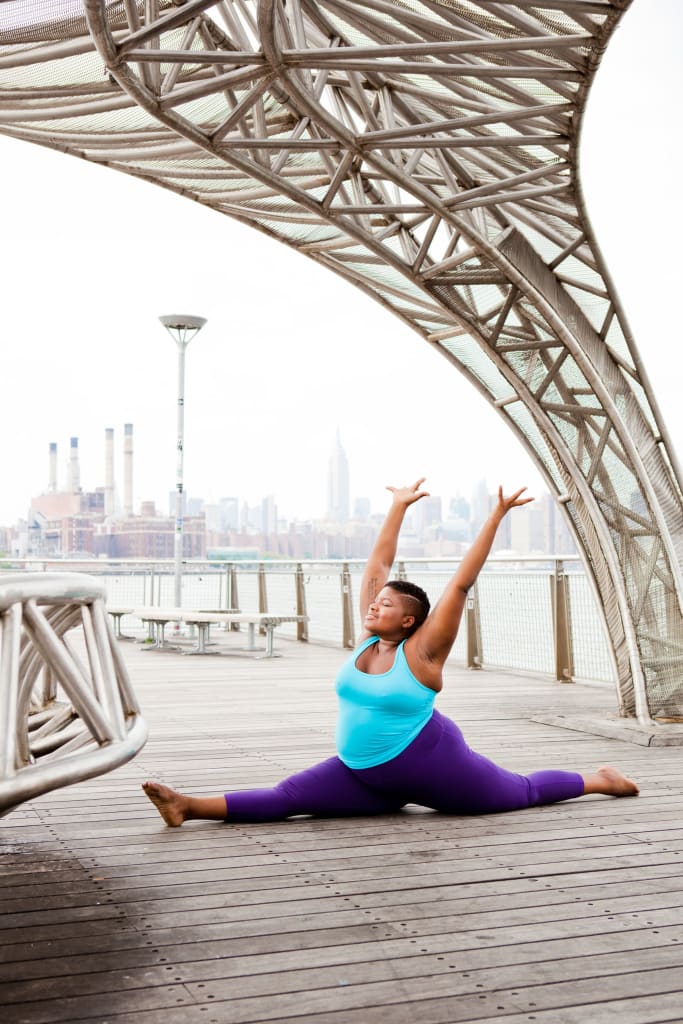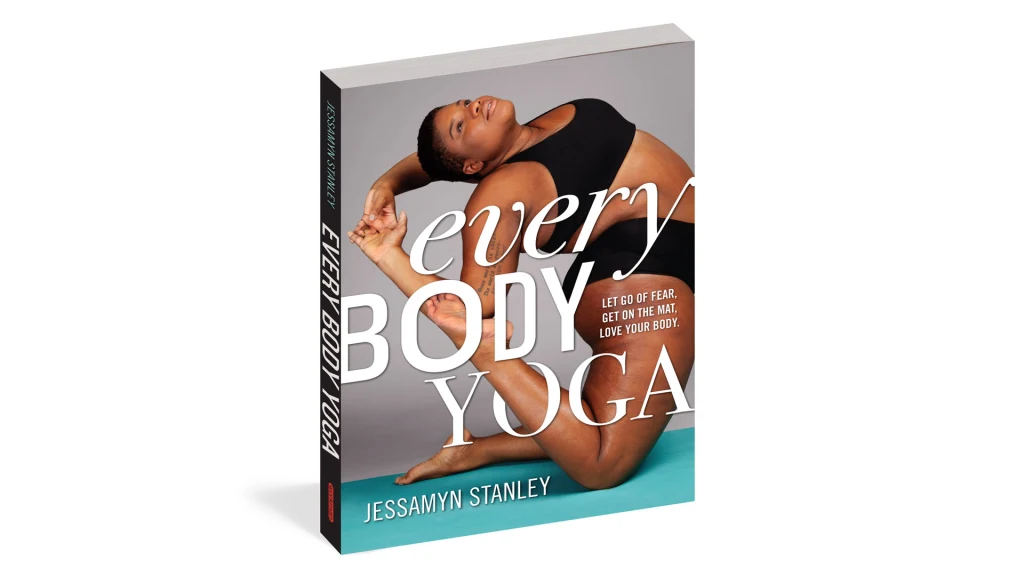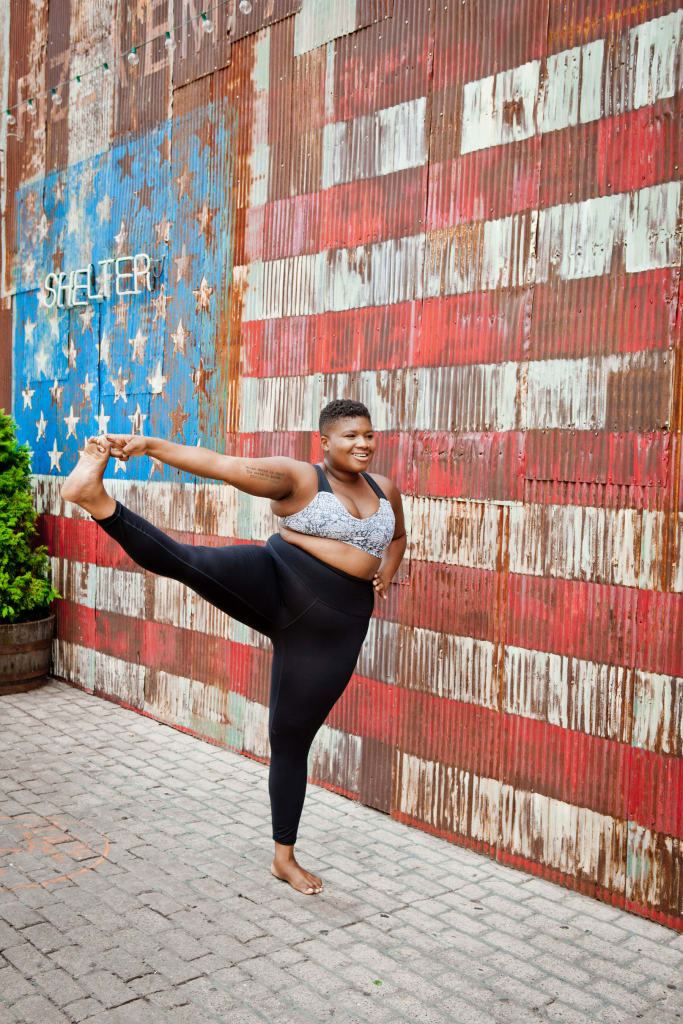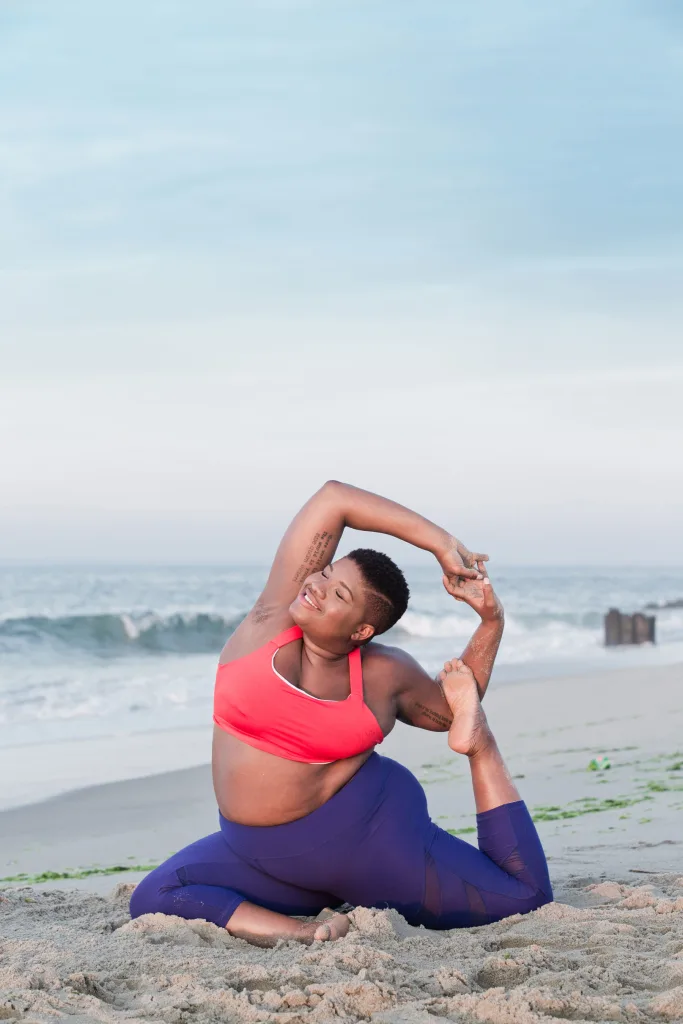Jessamyn Stanley likely isn’t the person you picture when you think of a yoga Instagram celebrity. As a self-described “fat femme,” she’s far from the stereotypical body type. And that’s exactly the point. The 29-year-old wants to change Americans’ perception of yoga. You could say she’s trying to democratize wellness.
“The more that I travel, the more it nauseates me how inaccessible [yoga] is,” she says.
Stanley boasts over 300,000 Instagram followers, a new book, Every Body Yoga: Get on the Mat, Love Your Body, along with a burgeoning fitness class empire. The body positivity advocate posts intricate poses and inspirational videos for people who feel excluded from the practice: minorities, the overweight, disabled individuals, and pretty much anyone suffering from body image issues. She’ll photograph herself doing the splits upside down, showing off her curvaceous body in an industry generally exemplified by a size two and toned abs.
“They want to see another person that’s like them,” says Stanley of her followers, many of whom, she says, feel intimidated by the average yoga studio. The average U.S. women’s size is 16, and 9.5% of adults practice some form of yoga, according to a report by the National Center for Health Statistics. The author believes a large swath of Americans want to practice yoga, but feel put off by traditional instructors as well as the mainstream media’s unattainable depiction of yogis.
“You rarely see a larger body practitioner,” says Stanley, adding, “you could say that of the whole wellness space.”
Related: You Make Your Fat Friends and Colleagues Feel Terrible And You Need To Know Why
Stanley made a bold name for herself by taking a confrontational approach to weight size and her battle with depression, albeit with a heavy dose of sincerity and an amusing touch of profanity. While many “fitfluencers” have perfectly orchestrated, well-lit backgrounds, designer athleisure-wear, and post upbeat mantras, Stanley broadcasts from a bare bedroom and posts captions like “Don’t they know that I don’t give a fuck?”
“You know, my yoga Asana practice isn’t pretty,” she writes in one post. “It’s fucking gruesome most of the time. It’s a lot of sweating, crying, swearing, falling down, and picking myself back up again. For most of us, the gruesome reality of an Asana practice is shocking. I mean, it’s all fun and games when you’re looking at Instagram photos, but real life is on some different shit.”
Throughout, Stanley repeatedly refers to herself as “fat”, a word more whispered behind backs than posted in public. She wears the term with pride, using it nonchalantly, humorously, and with a near sense of endearment.
Related: Being Fat In the Workplace Is Hard. Standing Up For Yourself Is Harder
“Fat has become synonymous with being dumb, unworthy, ugly, lazy, it’s almost like a profanity,” Stanley says of modern society’s use of the description.
Stanley’s repeated use of “fat” is an effort to reclaim a word she believes undeserving of its attached negative attributes. “The only way you can let go of a weapon, especially in the form of a word, is to take the weapon back,” she says. “I can be fat, but I can also be healthy, I can also be athletic, I can also be beautiful, I can also be strong. I don’t have to be limited by this word.”
Her insistence to fight for further inclusion of various body shapes struck a chord within the Instagram community. She has thousands of likes and comments, with followers admitting they cry watching her videos and find strength in her honest depictions of attempting a healthier lifestyle.
“You’re representing a lot of people but most importantly you represent you,” writes one. “You are a inspiration to the ones that don’t look like the so called ‘model-type,'” writes another.
But for every fan, there’s a”troll” who argues she’s “glorifying obesity” and encouraging unhealthy habits. She’s accustomed to these attacks, sighing in resignation to life within the social media eye.
Related: The Hidden Discrimination Against Being Fat At Work
“I don’t promote unhealthy lifestyles,” she asserts. “You can be healthy and fat.”
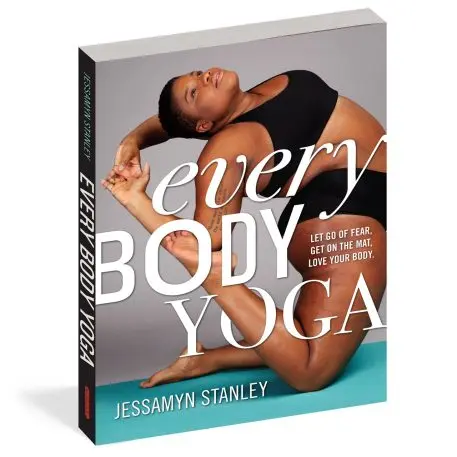
“I Am The Norm, I Am Not The Minority.”
Stanley began pursuing yoga only five years ago, rather reluctantly. While grieving a family death and dealing with depression during her second year of graduate school at the University of North Carolina, a classmate “dragged” her to a Bikram yoga class.
“[At first], I was like, ‘absolutely not,'” she recalls. “I tried it once when in high school and had an awful experience.”
Stanley also didn’t feel she had the funds to take up yoga, for which studios generally charge $20 a class. She felt similarly of the entire wellness industry, citing how she sees expensive items like coconut water “to be the absolute sign of financial prosperity.”
Her friend wore her down, pushing her to try one class before swearing it off entirely. Stanley attended, though she felt isolated from the very start.
“I was the largest person in the room,” she says, noting how the majority of attendees were “perfectly slender, usually white, [and] obviously has some kind of money to afford all those leggings.”
Despite her self consciousness, Stanley pushed past her insecurities. Pose by pose, she felt herself energized to stretch beyond her comfort zone. “It’s been a medicine that has helped me maintain sanity in my life,” she says of yoga’s calming effects. When she decided to wanted to further refine her practice, she decided on what she calls the “most body-positive studio of all time:” Home.
Stanley signed up for online yoga classes from the comfort of her Durham bedroom. The privacy provided her the space she needed to master the basics without worrying about stares or keeping up with fellow students. After several weeks, however, she realized she needed feedback on the more complicated poses, a benefit one can’t obtain from one-way tele-education. So, in 2011, she started photographing herself.
At first, she shared simple poses in hopes of alignment critiques from Instagram’s fitness circles. With her Samsung Galaxy S3 Mini, Stanley set a 30-second self-timer app and documented her daily progress. She quickly received feedback, but she was surprised by how many people—not just yogis—applauded her athletic vulnerability.
“I was overwhelmed by people [who responded] ‘Wow, I didn’t know that fat black people could practice yoga, I thought it was only white skinny women,” she says, adding, “there were a lot of people who think that I’m a unicorn.”
If anything, she says, “I am the norm, I am not the minority.” Minorities in yoga, she holds, only “have a visibility problem.”
The hundreds, then thousands, of strangers who reached out via Instagram motivated Stanley to keep the account going and further increase her postings.
“I quickly found my place in this virtual community and with it, a sense of inclusion and encouragement that I’d never felt in any yoga class,” she writes. “Apparently, when you show the internet your fat ass in a yoga pose, everyone wants to know how the hell you managed it.”
The postings were helpful in mastering her moves, and within a year, studios from all over America to Antarctica were requesting private tutorials or that she teach a class. But Stanley was self-taught and wasn’t really qualified to teach others.
“I did not want to be a yoga teacher,” she admits, noting that the world “has too many” yoga teachers already. Beside, she could not afford to go into training. Yoga teacher training traditionally requires between 200-500 hours and can range from a few thousand dollars up to $10,000.
Stanley was content to keep it a hobby until a flurry of press erupted in 2015. By then, Stanley had dropped out of studying performing arts management in graduate school and was contemplating her next move. Following profile pieces in New York magazine and on Good Morning America, the reluctant yogi got a final push from her father, a UPS truck driver, who offered her a loan (“no small thing, he’s working class,” she explains) to enroll in a local yoga training institute.
Stanley understood she possessed a unique perspective on the yoga learning process and only through formal training could she further advocate for getting more voices on mats.
“It is so imperative that many [different types of] people teach yoga because every single experience is unique, and my experience and my practice might not resonate for every human being, but it could resonate for least one,” she says.
https://www.instagram.com/p/BN0AphuDmv2/
Building A Body-Beautiful Empire
In 2016, Jessamyn began teaching weekly classes with a pay-what-you-can donation suggestion at Durham’s public parks and community centers. Earlier this year, she extended into online teaching for digital fitness portal Cody, which charges $29.99 for eight classes. Now, she’s released her book which is meant as an amuse-bouche for yoga beginners who “don’t feel comfortable walking into a studio,” says Jessamyn. In it, they’ll learn 50 basic poses and how to tailor the practice for all body types, with tips on how to move around with a large belly or how to tape down one’s boobs.
“I wrote [the book] for every person who is self-conscious about their body,” stresses Stanley.
In the last year, Stanley also found a place for herself among household-name brands eager to introduce new faces to the $3.7 trillion wellness market. She starred in campaigns for Kotex (“Find Your Fitness”), Motrin, FabFitFun, and REI (“Force of Nature”), as well as partnered with several nonprofit organizations benefitting women. Last month, she volunteered with Job Start, a prison-to-work transition program, to teach yoga to incarcerated women.
“Those are the people who really need it,” says Stanley.
Stanley is on a roll, but you won’t see her opening a yoga studio anytime soon (“the market is oversaturated,” she yawns). She’s busy finishing up a follow-up book, then working on launching her own nonprofit organization in the fall. Her goal is to set up a scholarship fund called PWYC (Pay What You Can), based on the donation model, that can be adopted by yoga studios around the country, specifically areas in which residents cannot afford classes. She hopes to launch the program in major cities by early 2018.
Stanley will also dip her toes into content media. She’s launching a podcast that examines how the teachings of yoga extend to mental health, relationships, politics, and all things in between. She wants yoga to be associated with more than, as she calls it, “buying things.” Stanley predicts the overpowering consumerism associated with the wellness market is an unsustainable trend that “will disappear in a decade.”
“A lot of ways that people understand the practice is through capitalism,” Stanley says, referencing fashion, pricey foodie items, and “all the gear” one thinks necessary for yoga. Despite her current involvement with brands, she thinks most companies are “just about selling stuff … and you can sell weight loss.” (The ad and promo campaigns she’s affiliated with, she insists, have some sort of body acceptance message.)
The podcast’s name, in a nod to what Stanley calls her “apathy for the [yoga] industry,” will be titled, Don’t Call Me a F**cking Yogi.
Stanley’s inclusive mentality extends to even those who, at first, might have been just the ones to intimidate her at yoga studios.
“Everyone is always shading Gwyneth Paltrow,” says Stanley of the GOOP founder, whom she respects for her ability to let criticism roll off her back. “She doesn’t care at all. I love that. I live for that.”
Recognize your brand’s excellence by applying to this year’s Brands That Matter Awards before the early-rate deadline, May 3.
